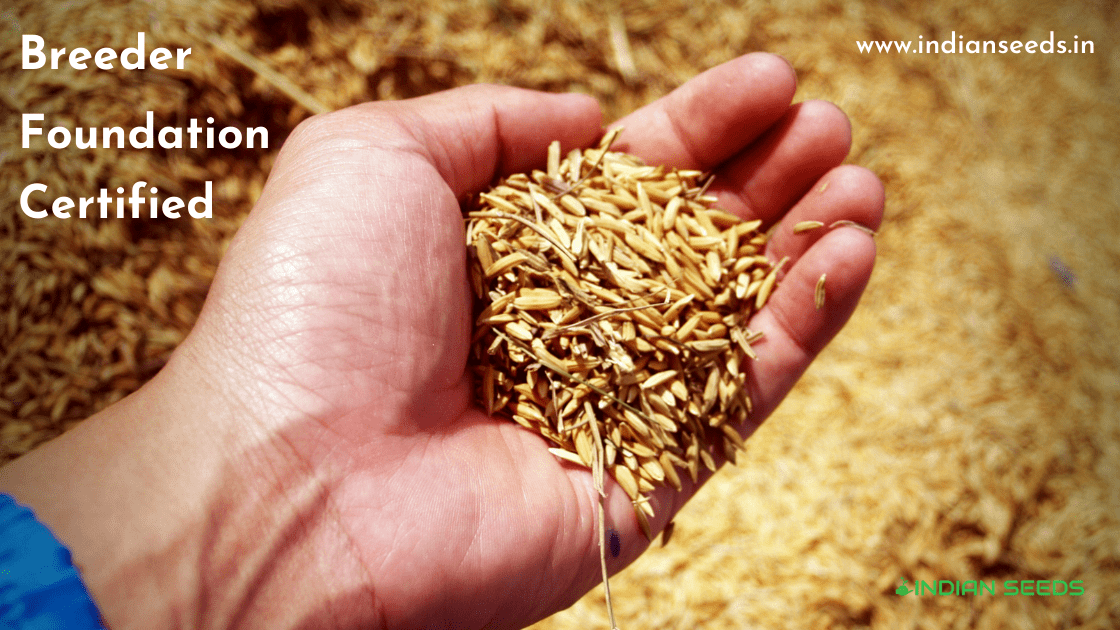For seed multiplication in a phased way, the Indian seed programme primarily adheres to the limited generations’ system. The system distinguishes between three generations of seeds: Breeder, Foundation, and Certified Seeds, and offers enough quality assurance measures in the seed multiplication chain to ensure that the variety’s purity is maintained as it passes from the breeder to the farmer.
Breeder Seeds
Breeder seed is the offspring of a variety’s nucleus seed and is generated by the original breeder or a sponsored breeder. The Indian Council of Agricultural Research (ICAR) is responsible for breeder seed production, which is carried out with the assistance of;
i) ICAR Research Institutes, National Research Centres, and All India Coordinated Research Projects on various crops;
ii) State Agricultural Universities (SAUs), which have 14 centres around the country;
iii) Sponsored breeders who have been recognised by chosen State Seed Corporations, and
iv) Non-Governmental Organizations (NGOs).
ICAR also promotes sponsored breeder seed production programme through the National Seeds Corporation (NSC) / State Farms Corporation of India (SFCI), Krishi Vigyan Kendras (KVKs), State Seeds Corporation (SSCs), etc.
Over the years, the production of breeder seed has steadily increased.
State Departments of Agriculture collect indents from various seed producing agencies and send them to the Department of Agriculture and Cooperation (DAC), Ministry of Agriculture, Government of India, which compiles the information crop by crop and sends it to the Project Director/Project Coordinator of the respective crops in ICAR for final allotment of production responsibility to various SAUs/ICAR institutions.
The workshop discusses the responsibility for producing breeder seed for the specific crop and assigns it to various centres based on the facilities and capabilities available at the centres and the accessibility of nucleus seed of a particular variety.
It should be emphasised that indents are prepared and sent to ICAR at least 18 months ahead of time. Monitoring terms and reporting proformae have been developed to make the programme more systematic and to allow for thorough evaluation of the breeder seed production programme.
The breeder of the variety, the concerned Project Director or his nominee, and a representative of NSC make up the monitoring terms. ICAR-DAC conducts an annual seed review meeting to assess the output of breeder seed.
ICAR informs DAC about the actual production of breeder seed by various centres. Following receipt of information from ICAR, the available breeder seed is distributed evenly among all indenters. The indents for breeder seed are placed by the concerned Director of Agriculture with the SAUs/ICAR institutes based in the State for varieties that are solely relevant to that State. The Director of Agriculture or foundation seed generating agencies designated by him lift the breeder seed directly.
Foundation Seeds
Foundation seed is the offspring of breeder seed and must be derived from either breeder seed or foundation seed that can be traced back to breeder seed.
The NSC, SFCI, State Seeds Corporation, State Departments of Agriculture, and private seed producers have been entrusted with the job of producing foundation seed because they have the requisite infrastructure.
Both field and laboratory testing are required for foundation seed to achieve the seed certification standards outlined in the Indian Minimum Seeds Certification Standards.
Certified Seeds
The progeny of foundation seed, certified seed, must meet the seed certification standards outlined in the Indian Minimum Seeds Certification Standards, 1988. In the event of self-pollinated crops, certified seeds can be made from certified seeds as long as the number of generations from the foundation seed stage-I does not exceed three.
State governments are largely responsible for the development and distribution of quality/certified seeds. State Seed Corporations, Departmental Agricultural Farms, Cooperatives, and other organizations produce certified seed.
Seeds are distributed through a variety of channels, including departmental outlets at the block and village level, cooperatives, seed corporation shops, private dealers, and so on.
NSC and SFCI, which create cultivars of national interest, augment the efforts of state governments. NSC sells its seeds through both its own marketing network and its dealer network. SFCI sells its seeds mostly through state agriculture departments and seed corporations.
The majority of NSC and State Seed Corporations’ certified seed production is done through contract growing partnerships with progressive farmers. SFCI grows its own seeds on its own fields. The private sector has begun to play a significant role in the delivery of high-quality seeds for vegetables and crops such as hybrid maize, sorghum, Bajra, cotton, castor, sunflower, and paddy, among others.
State governments determine the need for certified/quality seeds based on the area seeded under various crop kinds, the area covered by hybrid and self-pollinated varieties, and the seed replacement rate obtained.
State Departments of Agriculture determine seed availability based on seed production in government farms as well as seed production by State Seed Corporations and other entities. During the bi-annual Zonal Seed Review Meetings and the National Kharif and Rabi Conferences, the Government of India assesses the demand for and availability of seeds in detail with State Governments and seed producing agencies.
To guarantee that seed requirements are met to the greatest extent possible, the Department of Agriculture and Cooperation encourages tie-up arrangements with seed producing agencies.
Thank You














